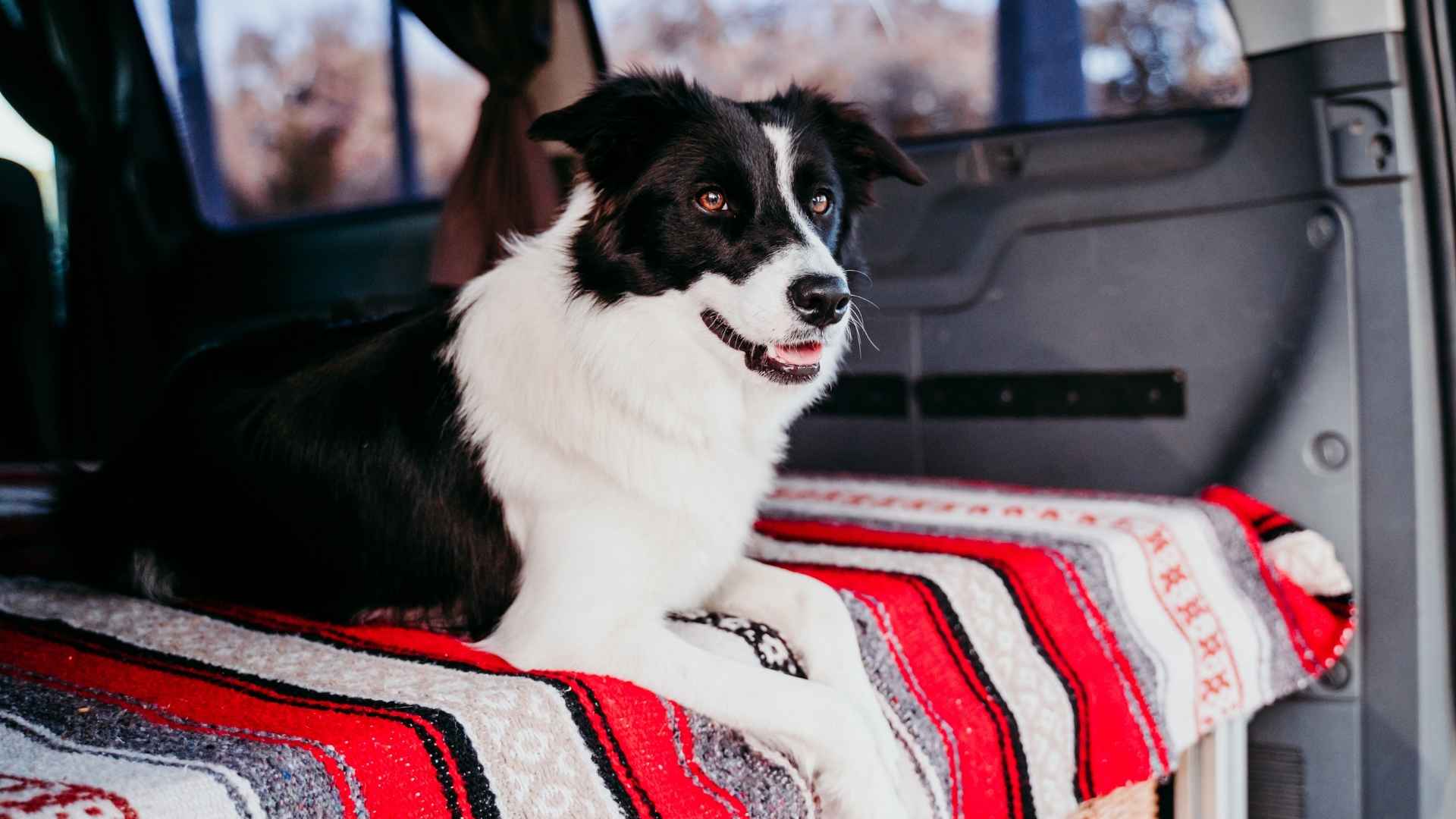With over 25 million Americans hitting the open road by RV each year, it’s no wonder that more dogs are joining their humans for the ride. There’s something magical about waking up to a fresh view just outside your window, and sharing that experience with your furry companion makes it even better.
As RV-friendly campgrounds and pet-welcoming businesses continue to grow, planning a road trip with your pup has never been easier. Still, for those embracing full-time RV living, the shift from stationary homes to a mobile lifestyle can be a big one, for both dogs and humans. While many dogs can adapt, certain breeds are especially well-suited for life on the move.
Whether you’re parking by the ocean or camping in the mountains, some breeds are ideal co-pilots thanks to their size, temperament, and easygoing nature. These dogs are travel-hardy, adaptable, and happiest wherever you are.
Best Dog Breeds for RV Travel
1. Dalmatian
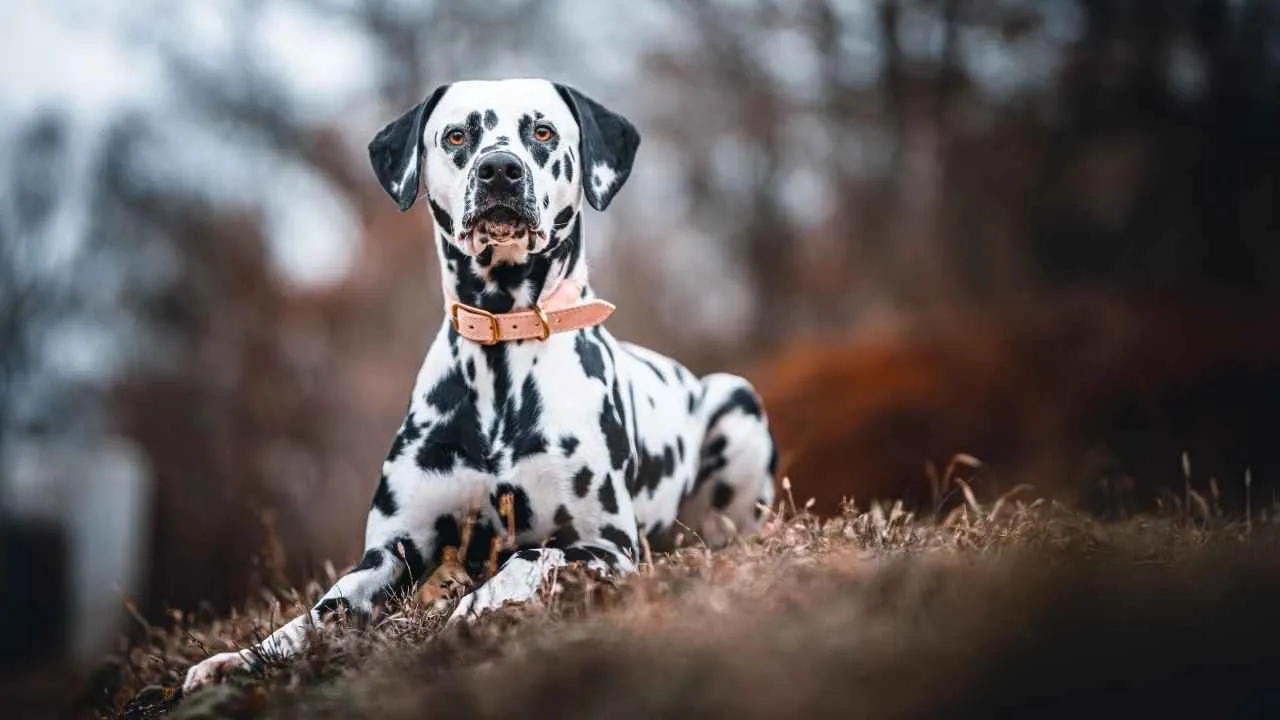
Athletic, alert, and undeniably iconic, the Dalmatian, also known as the English coach dog or firehouse dog, is a dynamic breed built for adventure. Originating from the Dalmatia region of Croatia, its precise ancestral roots remain unclear, though its historic roles range from war dog to carriage escort. Today, the Dalmatian is prized for its lean build, signature dark spots on a white coat, and boundless energy.
Standing between 19 and 24 inches tall and weighing 45 to 70 pounds, this non-sporting breed has a lifespan of 11 to 13 years. Britannica describes the Dalmatian as a playful and fun-loving companion suited for active individuals of all ages. With a friendly yet vigilant temperament, it’s as well-suited to family life as it is to keeping an eye on your parked RV. This is one of the best traveling dogs.
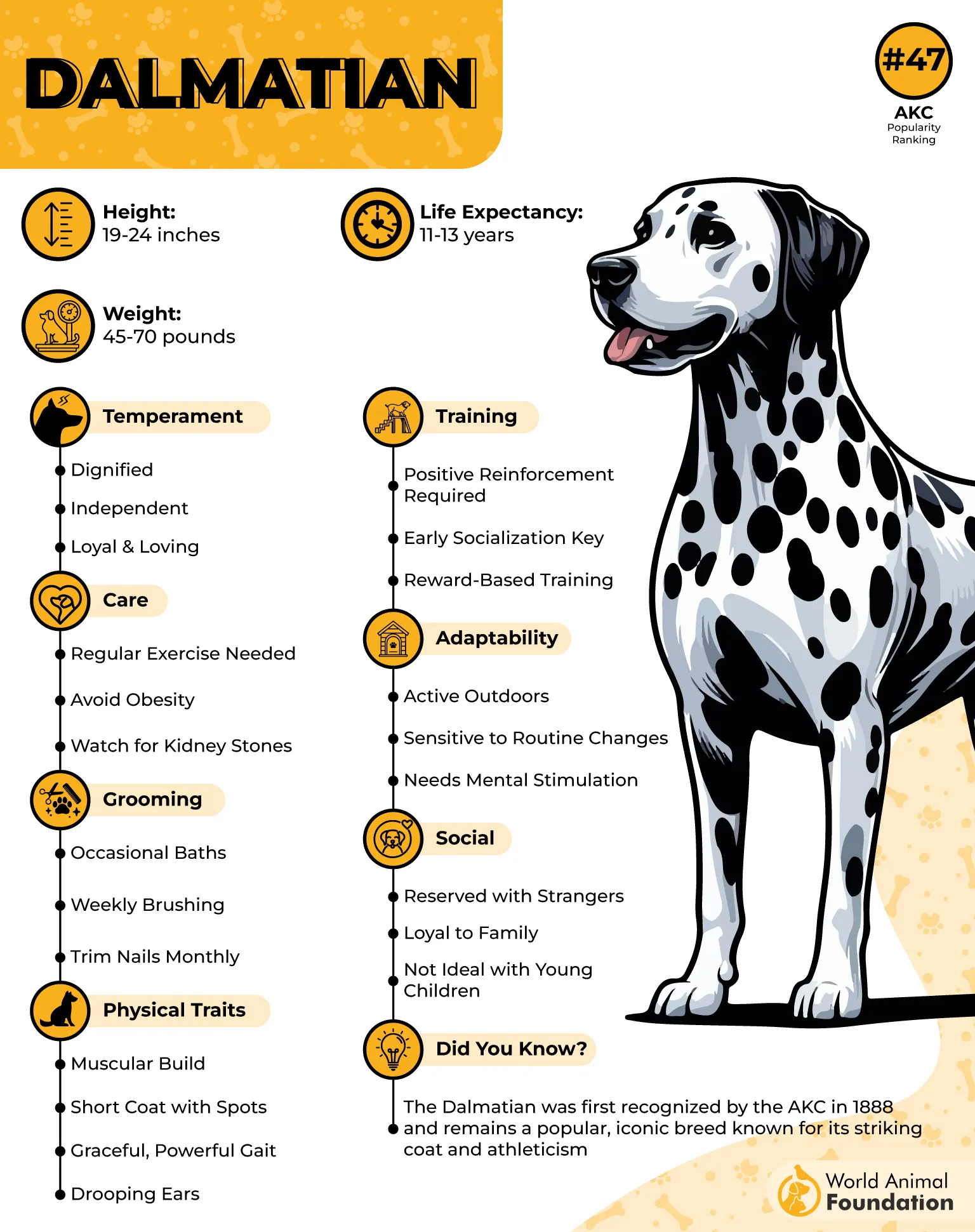
Care Needs
Dalmatians thrive on high activity levels and need plenty of daily exercise, making them perfect companions for hikers, bikers, and active road-trippers. Their weather tolerance suits varied climates, but they do shed heavily and require daily brushing to manage their coat. Mental stimulation and consistent training are also key to avoiding behavioral issues during long drives or stationary days.
Fun Fact: Dalmatians became firefighting mascots due to their historical role of calming and guarding horses that pulled fire wagons, a tradition that continues with the Budweiser Clydesdales today.
2. Labrador Retriever
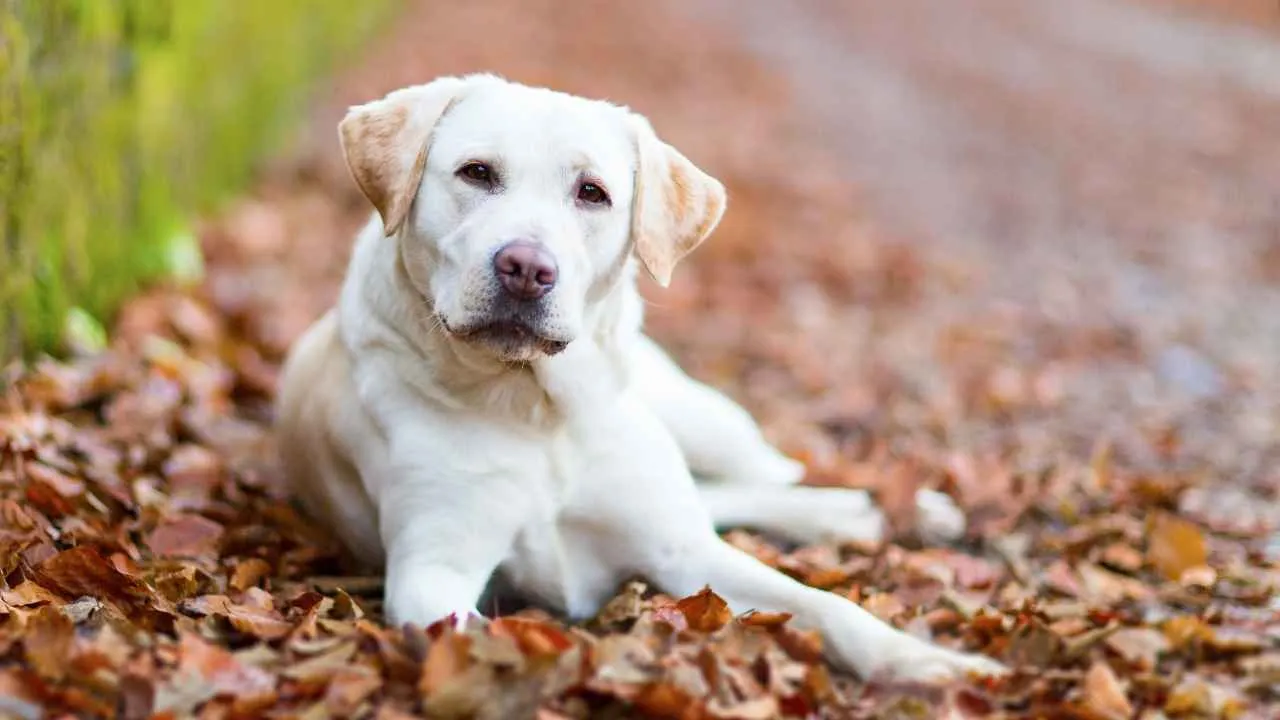
Also affectionately known as the Lab, the Labrador Retriever is a classic American favorite and a natural choice for RV life. Originating from Newfoundland and later refined in England, this breed has earned its reputation as a versatile, friendly, and adventurous companion.
Labs typically stand 21.5 to 24.5 inches tall and weigh between 55 to 80 pounds, with males on the heavier end of the scale. Their short, dense coats come in black, yellow, or chocolate, and their signature “otter tail” helps them swim with ease, a bonus for road trippers who love water destinations.
Known for their gentle temperament and trainable nature, these furry friends are part of the Sporting Group and live approximately 10–12 years. PetMD states that Labradors are typically very affectionate, even with strangers.
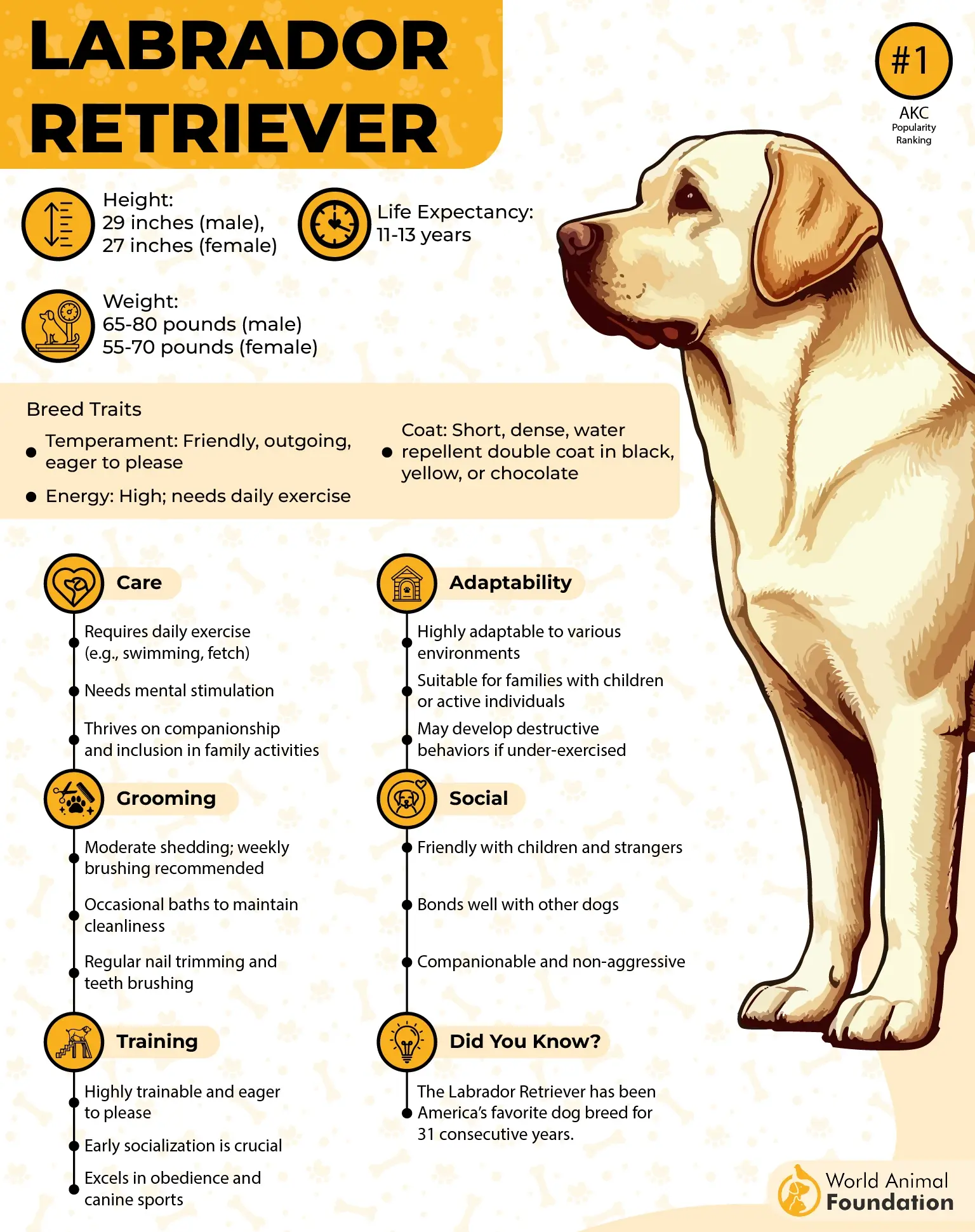
Care Needs
Labradors are low-maintenance when it comes to grooming, thanks to their short coat, though regular brushing reduces loose fur. They tend to do daily exercise, so make time for walks, swimming, or a rousing game of fetch at RV stops. Labs love mental stimulation too, so toys and tasks are essential. Their sociable, eager-to-please attitude means they do well in social campground settings.
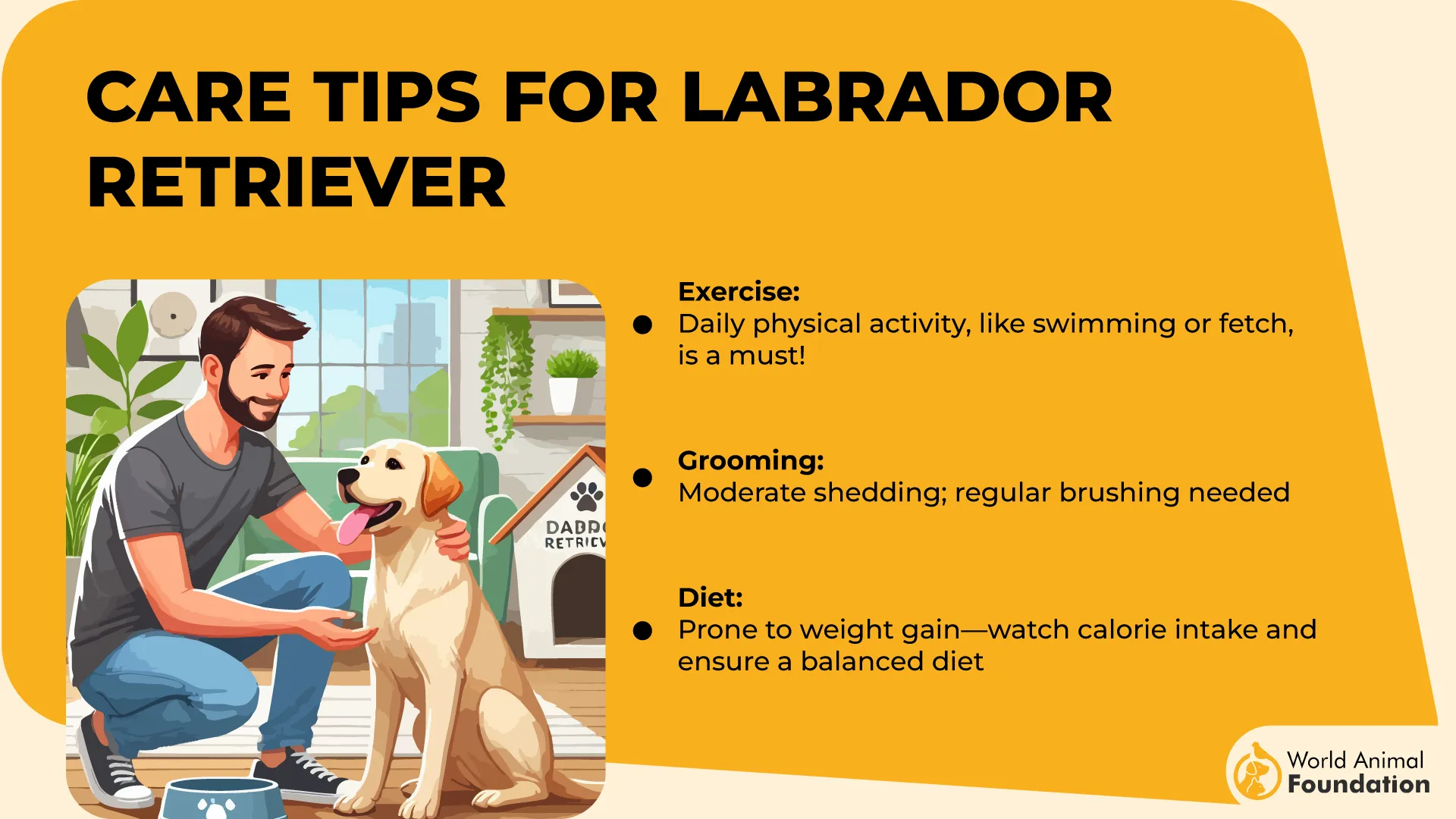
Fun Fact: A yellow Lab named Endal became a national hero after saving his disabled owner’s life, earning the title “Dog of the Millennium.”
3. Beagle
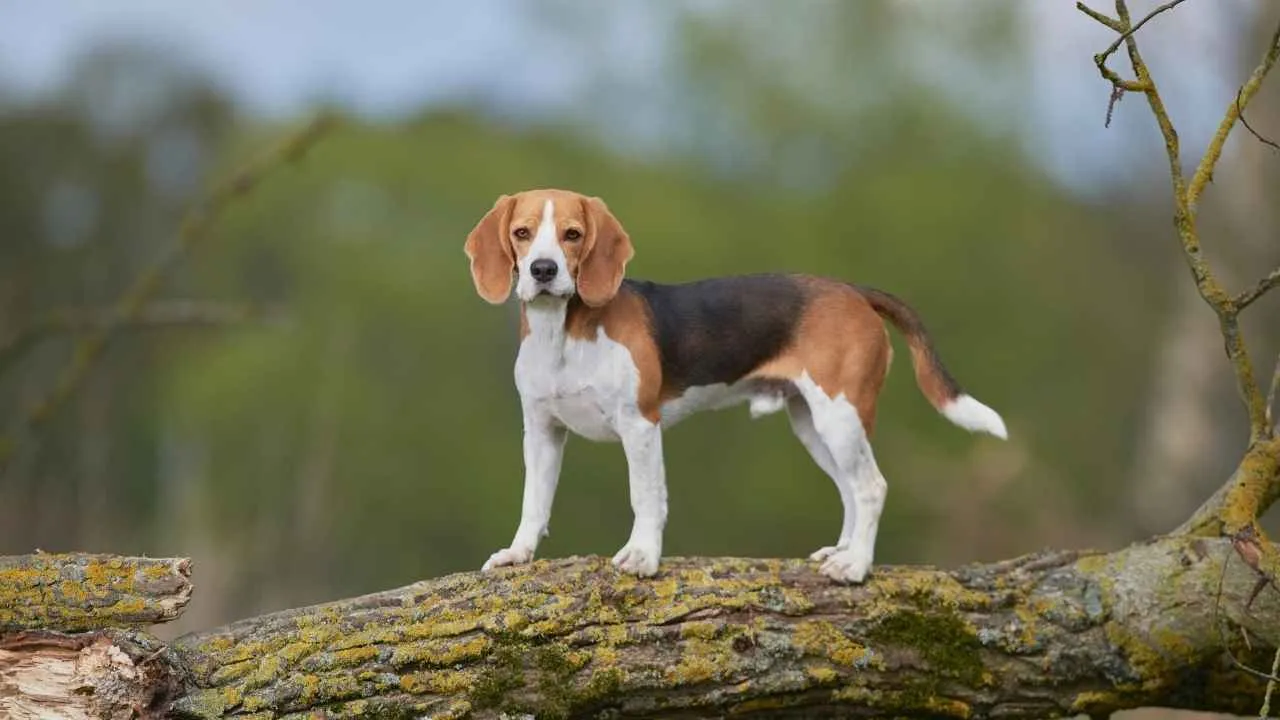
Compact, cheerful, and always ready for adventure, the Beagle is a small-to-medium-sized hound with roots in Great Britain. Purina describes Beagles as affectionate and intelligent dogs. Recognized by the American Kennel Club as part of the Hound Group, this breed typically stands between 13 and 15 inches tall and weighs 20 to 30 pounds.
With soulful brown eyes, long floppy ears, and a tri-colored short coat, often black, tan, and white, the Beagle resembles a miniature foxhound. Originally bred for hunting rabbits and hares, it remains alert and curious, making it a perfect fit for RVers who enjoy exploring trails and outdoor activities. Their sociable nature and sturdy frame make them great companions on the road.
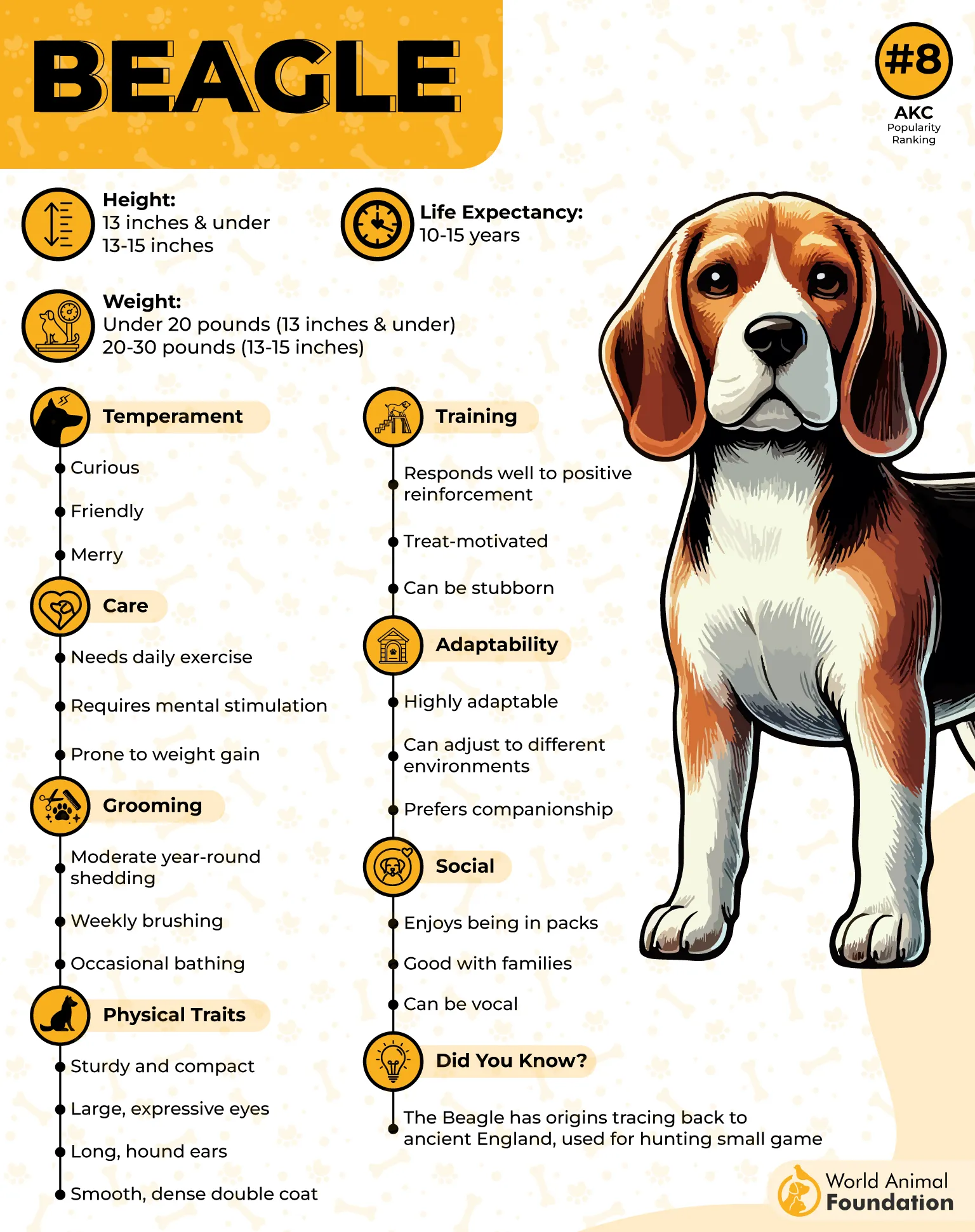
Care Needs
Beagles thrive on companionship and can become vocal if left alone for extended periods. Daily walks and mental stimulation are essential to manage their energetic spirit. While their short coat is low maintenance, they do shed, so regular brushing and a handy lint roller help keep your RV tidy. Keep them on a leash; this scent-driven pup is known to follow its nose without hesitation.
Fun Fact: The U.S. Customs “Beagle Brigade” uses these dogs for airport inspections due to their keen sense of smell and calm presence in crowds.
4. Yorkshire Terrier
Don’t let their dainty appearance fool you, the Yorkshire Terrier, or “Yorkie,” is a spirited and adventurous toy breed with roots as a tough little ratter in the mines and mills of 19th-century England. Standing just 7 to 8 inches tall and weighing no more than 7 pounds, this compact pup is ideal for RV life, fitting easily into small spaces without sacrificing personality.
With their steel blue and golden tan coats, perky ears, and bold attitude, Yorkies are as fashionable as they are fearless. Recognized by the American Kennel Club since 1885, they offer a blend of style, spunk, and snuggly companionship that makes them a favorite among urbanites and RV travelers alike. Most Yorkies live between 11 to 15 years.
Care Needs
Yorkies are moderately active and don’t require extensive exercise, just a daily walk or indoor play. Their fine, silky coat needs regular brushing to avoid tangles, especially in longer styles.
They are prone to dental issues, so brushing their teeth is essential. Bathing and nail trimming should be part of a consistent grooming routine. Their size and energy level make them easy travel companions with minimal outdoor demands.
Fun Fact: A brave Yorkie named Smoky served in WWII, surviving air raids and earning eight battle stars.
5. Dachshund
Affectionately nicknamed the “wiener dog” or “doxie,” the Dachshund is a small, lively breed with a bold spirit and a surprisingly adventurous streak. Originating in Germany, their name means “badger dog,” a nod to their early purpose of burrowing into dens.
Dachshunds come in two sizes, miniature (up to 11 pounds) and standard (16–32 pounds), and sport one of three coat types: smooth, longhaired, or wirehaired. Standing between 5 to 9 inches tall, they make an ideal travel-sized pup for RV life. With an average lifespan of 12 to 16 years, they’re built for long-term companionship and plenty of memories on the road.
Care Needs
Dachshunds thrive on routine, short walks, and a bit of playful mischief. To protect their long back, avoid letting them jump off furniture, and use pet ramps when needed.
Regular, gentle exercise strengthens their core muscles and supports spinal health. While they aren’t fans of intense workouts, they enjoy sniffing around at stops during RV breaks. Keep them at a healthy weight and offer frequent rest to avoid back strain.
Fun Fact: Despite their size, Dachshunds are the only breed officially recognized for hunting both above and below ground.
6. Greyhound
Regal, relaxed, and remarkably fast, the Greyhound is a breed of ancient origin, tracing back to Egypt. Once symbols of nobility, they were treasured for their incredible speed, capable of reaching up to 45 miles per hour, and their sharp sight, which made them ideal for hunting hares and deer.
Despite their athletic prowess, Greyhounds are surprisingly low-energy indoors. Males typically stand between 28 to 30 inches tall and weigh 60 to 80 pounds, while females are slightly smaller.
With sleek, short coats in a wide range of colors, including fawn, brindle, and blue, this hound group member boasts a life span of 10 to 13 years. Their calm, quiet nature and slim, space-saving frame make them ideal companions for long road trips in cozy RV quarters.
Care Needs
Greyhounds have minimal grooming demands thanks to their smooth coat, but they’re sensitive to temperature extremes and should be kept warm in cooler weather. Daily brushing isn’t necessary, but regular nail trims and dental hygiene are key.
Though athletic, they need only short bursts of exercise, think brief walks or fetch sessions, before they’re content to nap the rest of the day away. Their gentle temperament means they integrate easily with new routines and surroundings.
Fun Fact: Greyhounds were among the first European dogs brought to the Americas, accompanying Columbus on his second voyage in 1493.
7. Jack Russell Terrier
Also known as the Parson Russell Terrier, the Jack Russell is a compact powerhouse of energy and personality. Originally bred in 19th-century England for fox hunting, this terrier stands 10 to 15 inches tall and weighs between 13 and 17 pounds. With a muscular frame, button ears, and a weatherproof coat, smooth, broken, or rough, this breed is as rugged as it is charming.
Their signature white coats are typically accented with black, tan, or brown markings. Despite their small size, they’re fearless, tenacious, and ready for action, making them ideal for on-the-go families. With a life expectancy of 13 to 18 years, they’re a long-term travel buddy with a boundless spirit.
Care Needs
These smaller dogs thrive on daily activity and mental challenges. A brisk walk or a game of fetch can burn off their energy, while trick training and agility courses offer vital stimulation. Smooth-coated types require only weekly brushing; broken coats may need occasional hand-stripping.
Regular vet checkups are advised, as they may be prone to lens luxation. Their small size and low grooming needs make them RV-friendly, just keep them leashed due to their high prey drive.
Fun Fact: A Jack Russell named Uggie became the first dog to leave paw prints on the Hollywood Walk of Fame.
8. Golden Retriever
One of America’s most beloved breeds, the Golden Retriever is a friendly and dependable travel companion. Originally developed in 19th-century Scotland as a gundog and water retriever, this Sporting Group breed quickly became a family favorite for its affectionate nature and high adaptability. Goldens typically stand between 21.5 and 24 inches tall and weigh 55 to 75 pounds.
Their flowing, water-repellent double coats range in color from pale cream to deep russet gold, giving them their signature look. With a life expectancy of 10 to 12 years, Golden Retrievers are known for their eagerness to please, social demeanor, and calm presence, even on long road trips.
Care Needs
Golden Retrievers require consistent grooming due to their thick double coats, which shed heavily and can mat behind the ears and hind legs. Brush them regularly to manage shedding and maintain coat health.
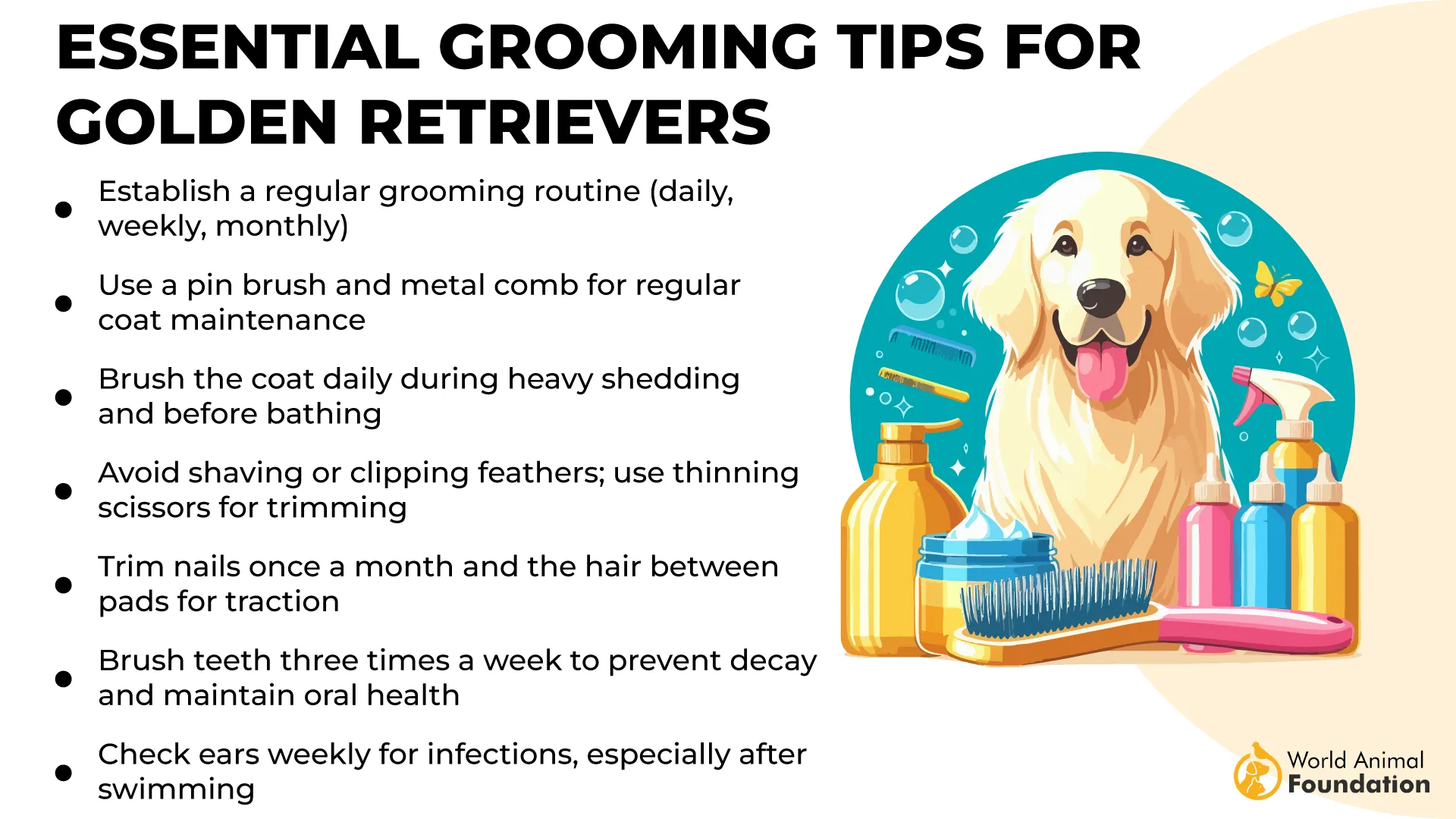
Though energetic, they travel well and can remain calm for extended drives, just ensure they get breaks for stretching and bathroom needs. These dogs thrive with daily activity, like swimming or a game of fetch during RV stopovers.
Fun Fact: Every Golden Retriever can trace its lineage back to a litter born in 1868 at Guisachan House in the Scottish Highlands.
9. French Bulldog
Affectionately known as the “Frenchie,” the French Bulldog is a compact, sturdy member of the Non-Sporting Group. Originally bred in France during the late 1800s from small native dogs and toy Bulldogs, this breed quickly became a beloved city companion.
Standing 11 to 13 inches tall and weighing under 28 pounds, Frenchies are recognizable by their flat faces, large bat-like ears, and muscular, petite bodies. Their alert expressions and even temperaments make them an ideal fit for RV living, especially for casual campers and part-time travelers.
With a lifespan of 10 to 12 years, they thrive on companionship and make excellent travel mates due to their quiet nature and minimal exercise requirements.
Care Needs
French Bulldogs are low-maintenance, but a few key precautions help them stay healthy on the road. Their short snouts make them prone to overheating, so always keep them cool and never leave them in hot RVs or direct sun. Clean the folds of their face regularly and avoid letting them near open water, as they cannot swim well. Brisk walks and short play sessions are enough to meet their exercise needs.
Fun Fact: A champion French Bulldog once sailed on the Titanic; his owner survived, but the brave pup did not.
Conclusion
Life on the road is full of adventure, and choosing the right travel companion can make the RV lifestyle even more rewarding. Whether you prefer larger breeds that enjoy long road trips or smaller, adaptable dogs like the Miniature Schnauzer, finding a breed that’s calm, well-behaved, and travel-friendly is key. While larger dogs may need more space, many adapt well to RV parks with proper training and structure. Some RVers even travel with service dogs, whose reliability and training provide both support and companionship on the move.
Keep in mind that not all dogs or pets adjust to life on wheels. Dogs that are high maintenance or overly anxious may find travel stressful. When planning extended trips or excursions, consider using trusted pet sitters if your puppy or senior pet needs a break. RV travel can also include cats, if they’re accustomed to sleeping and relaxing in confined, moving spaces. With the right preparation, your furry friend, like many other dogs, can become the ultimate co-pilot.


